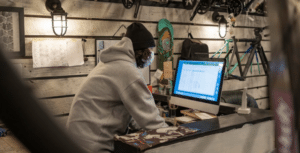Content downloading used to be a bit of a taboo subject, particularly during the heady days of large-scale pirating and the various heavy-handed punishments that often came along with it.
Fortunately, along came the fast internet and, with it, a plethora of streaming services that almost eliminated the need to download anything ever again. Nonetheless, there are various reasons why one may still choose to download a show or movie.
Today, I’ll share with you seven tips to ensure that you perform the task safely and responsibly to prevent problems regarding malware and the law.
Use A VPN To Secure Your Connection
When discussing downloading anything from the web, it would be highly remiss to exclude the most interesting technological development of the past few decades: the humble VPN.
A VPN is a virtual private network that, in layman’s terms, creates a tunnel that is highly encrypted (often using military-grade encryption), where data can pass freely without risk of being snooped on, intercepted, or whatever else a nefarious actor might do with or to it.
Although you can use these tools for more than merely hiding your data and IP address when downloading content, they also serve this purpose very well.
One of the top options is IPVanish, which prides itself on being one of the best for torrenting. If you plan on going down this route, it’s a good idea to investigate the best IPVanish settings for Torrenting to achieve your desired results without interruption or issues. This allows you to obtain the most consistent downloads while remaining anonymous.
Always Check The Source First
Failing to verify sources properly can expose computers and devices to malware, tracking software, or even identity theft. Before clicking download from any site, the most important thing to do is scrutinize where it’s originating from.
Evaluate whether the source is trustworthy based on online reputation, credentials listed, and consistency with the types of files typically provided. Malicious actors regularly set up decoy pages to peddle infected material.
Taking just an extra few seconds to inspect URLs and check reviews could save hours of troubleshooting down the line. When you download from legitimate publishers, you ensure the files you acquire are safe, vetted, and supported. As the saying goes, if a deal looks too good to be true, it usually is.
Use Reputable Websites And Platforms
With countless options online, it’s easy to get distracted by promises of free or hard-to-find content. But one of the best ways to download files securely is to stick to well-known, reputable sources you can trust.
They employ security best practices like malware scanning, digital signatures, and vetting developer credentials. Sticking exclusively to these platforms when downloading movies, songs, games, or other apps ensures what you get is legitimate, supported, and safe.
Never Trust Suspicious Links
We’ve all been tempted by the promise of pirated movies or cracked software via suspicious links. However, clicking unknown files carries serious risks. Hackers regularly use deceiving messages as bait to plant malware.
They may pose as a service you trust or make a link seem intriguing to trick you into installing spyware or viruses. It takes just one click for your devices and data to be compromised. Instead of taking the bait, stop and inspect any link promising copyrighted or paid content for free.
Hover over URLs to check they go where advertised. Question unsolicited messages offering downloads out of the blue. Instead of curious clicks, verify the source through independent searches.
Be Mindful Of Copyright Laws
While the internet has made accessing media more accessible than ever, it’s important for consumers to remain aware of copyright laws when downloading or streaming content. Just because pirated versions exist online doesn’t mean obtaining them through unofficial sources is legal.
Copyright infringement can result in fines or even jail time in some cases (albeit limited to those who are producing bootlegged downloads at scale). Besides avoiding legal trouble, being mindful of intellectual property helps support the creative industry.
Keep Your Antivirus Software Updated
While being judicious about where and what you download is key, having robust antivirus protection on all your devices provides an essential safeguard.
Hackers are constantly evolving their techniques to infect users. However, antivirus companies work diligently to analyze new strains of malware and release updated detection definitions. Keeping your antivirus software updated ensures it recognizes and can defend against the latest threats online.
Schedule automatic updates so your devices are always protected. Don’t take chances with out-of-date definitions by postponing or ignoring updates.
Avoid Downloading From Public Wi-Fi
While coffee shops and airports provide convenient internet access, public Wi-Fi hotspots pose cyber risks. These open networks are vulnerable to hackers using techniques like man-in-the-middle attacks to intercept unencrypted data. The small conveniences aren’t worth the potential compromise of personal information or infection of devices with malware.
Exercising care with downloads protects both personal devices and creative works. Taking basic precautions like using a VPN, vetting sources, and avoiding suspicious links helps you remove as much uncertainty from the process as possible.









